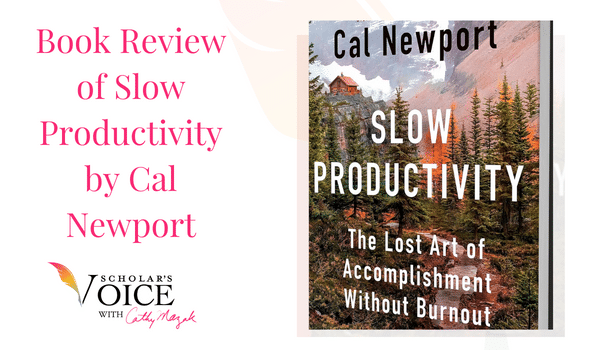Book Review of Slow Productivity by Cal Newport

In today’s episode, I review Cal Newport’s latest book, Slow Productivity: The Lost Art of Accomplishment Without Burnout. I loved his book Deep Think and recommend it often. I was excited to read his newest work and wanted to relay my thoughts and insights to you!
MORE DETAILS
In Slow Productivity: The Lost Art of Accomplishment Without Burnout, Cal addresses the challenges knowledge workers face surrounding productivity. I compare his advice to the teachings in Navigate and share which of his principles relate to academics. I also explain why I disagree with some of Cal’s recommendations and what I suggest knowledge workers do instead.
Do I recommend reading Slow Productivity: The Lost Art of Accomplishment Without Burnout? Tune in to hear my full critique!
What is the Book About?
Knowledge work is relatively new, and there needs to be concrete proxies against which to measure productivity. In Slow Productivity: The Lost Art of Accomplishment Without Burnout, Cal Newport explains how tasks that fall under sudo-productivity, like planning, the amount of time spent in the office, and answering emails, are overhead that takes time away from deep thinking. Instead, he challenges knowledge workers (and academics) to adopt a slow productivity method that focuses on three key principles: do less, work at a natural pace, and obsess over quality.
What I Liked About the Book
The first part of the book resonated deeply with the teachings in the Navigate program, a testament to its credibility. I found myself in agreement with Cal Newport on several principles, including:
- The ‘work around work’ like answering emails and planning will overwhelm your time.
- Every career has seasonality, and establishing a work rhythm that aligns with calendar obligations, busyness, and a productive mindset is essential.
The most revolutionary part of the book discusses work systems. Academics are forced to create processes for completing projects, teaching, getting grants, etc. This autonomy presents challenges around productivity because finding the way you need to work to be most productive is complex and a concept unique to knowledge workers.
What I Didn’t Like About the Book
My main critique of Cal Newport’s book, Slow Productivity: The Lost Art of Accomplishment Without Burnout, is the lens through which he bases his advice. There is a clear bias and tone that may not resonate with everyone, particularly those of different races or gender identities. Even his recommendations for reducing work overhead don’t consider individual circumstances. Moreover, his emphasis on work quality seems to stem from a place of judgment and superiority without acknowledging the inherent biases in research and writing that can affect work quality.
Finally, Cal Newport suggests “writing when the kids go to bed.” I believe in doing your best work during regular working hours and keeping boundaries around your time. Advising to write in the evenings or early mornings creates more work, not less, and prevents any work-life balance.
“My favorite idea of the whole book is that the systems of work done in knowledge work, the systems of how work gets done, falls on the individual doing the work. Compared to manufacturing or production jobs where the systems of production are pre-established and workers step into systems that exist, knowledge work is not like that. As a professor, the major freak out people have when they start their job is having to figure out how to go to meetings, prep classes, write, and conduct research. Every academic makes those processes up from scratch.”
“If you are looking for a slower career in the sense that you want to slow down to speed up or slow down to get better or want to feel less busy and do higher quality work, Navigate is the program for you. I believe so strongly that the Navigate program is what every woman and non-binary academic should do in order to get that solver, more enjoyable, juicy scholarly career.”
Check out the Navigate program details and start your application process here.
CONTINUE THE CONVERSATION:
- Our 12-week Navigate: Your Writing Roadmap® program helps tenure-track womxn and nonbinary professors to publish their backlog of papers so that their voice can have the impact they know is possible. Apply here!
- Cathy’s book, Making Time to Write: How to Resist the Patriarchy and Take Control of Your Academic Career Through Writing is available in print! Learn how to build your career around your writing practice while shattering the myths of writing every day, accountability, and motivation, doing mindset work that’s going to reshape your writing, and changing academic culture one womxn and nonbinary professor at a time. Get your print copy today or order it for a friend here!
- Want to train with us for free on your campus? Now you can when you recommend our Scholar’s Voice™ Faculty Retreats to a decision-maker on your campus! Download the brochure with the retreat curriculum and both in-person and online retreat options here.
- If you would like to hear more from Cathy for free, please subscribe to the weekly newsletter, In the Pipeline, at scholarsvoice.org. It’s a newsletter that she personally writes that goes out once a week with writing and publication tips, strategies, inspiration, book reviews and more.
FOLLOW US ON SOCIAL:
RELATED PODCASTS
Stay current in Academic Publishing
Subscribe to our newsletter:
In the Pipeline
writing tips, publishing trends, reading recomendations, free workshops





